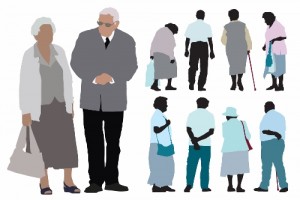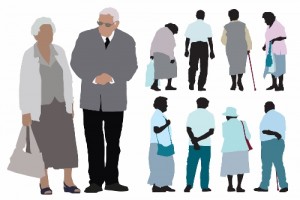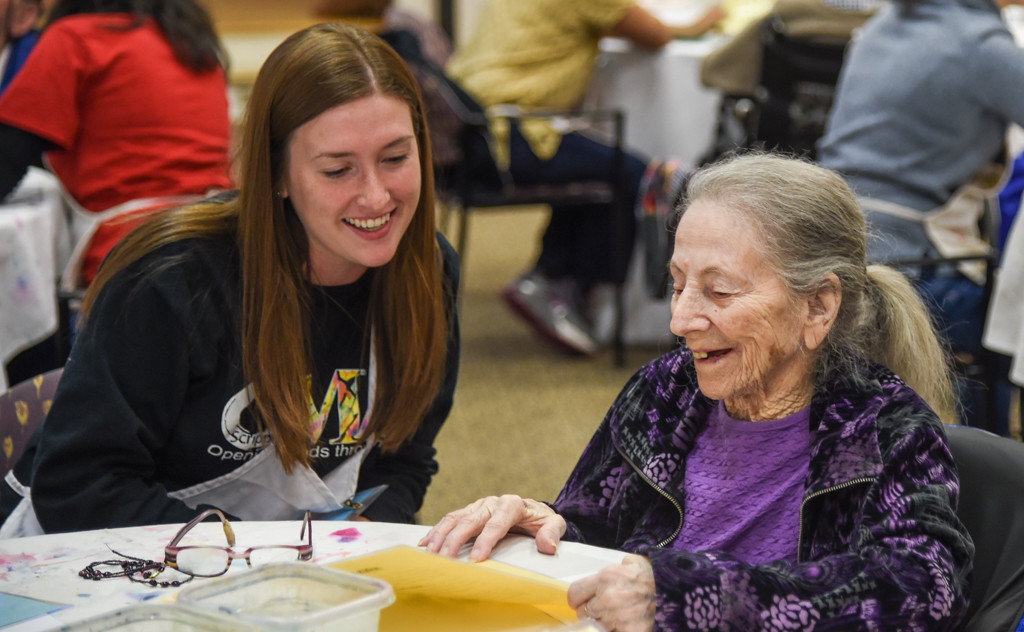Aging - Who Are Former People?

 There’s a little quip that I’ve heard in senior communities that goes something like this; “I’m looking for Mrs. B., can you tell me what she looks like? “Yes, she’s the one with gray hair and glasses!” Not that original, really, but you get the picture. I’ve often been struck with profound awareness when I enter the dining room of a nursing home. At first glance it looks like a sea of gray heads and everyone sort of blends together. The quip suggests these old folks all look alike so they are alike and have morphed into some other kind of creature. At what point do we become one of “them”? I have a psychologist friend who counsels young children. She once told me that she’s effective because she doesn’t talk down to the kids or treat them as “pre-people”. Something about her comment rings true and, by comparison, I think we live in a society that views our aging population as “former people”. When do we lose our individual identity and become a former person?
There’s a little quip that I’ve heard in senior communities that goes something like this; “I’m looking for Mrs. B., can you tell me what she looks like? “Yes, she’s the one with gray hair and glasses!” Not that original, really, but you get the picture. I’ve often been struck with profound awareness when I enter the dining room of a nursing home. At first glance it looks like a sea of gray heads and everyone sort of blends together. The quip suggests these old folks all look alike so they are alike and have morphed into some other kind of creature. At what point do we become one of “them”? I have a psychologist friend who counsels young children. She once told me that she’s effective because she doesn’t talk down to the kids or treat them as “pre-people”. Something about her comment rings true and, by comparison, I think we live in a society that views our aging population as “former people”. When do we lose our individual identity and become a former person?
Since none of us are immune from cultural influence perhaps it falls to each of us to question the collective attitude and see beyond the stereotypes of old age. Common language and images are a good place to start. We can pay attention to the words we use. Ever call someone a “cute little old lady”? We may as well pat her on the head! Media today is laced with messages that reinforce the idea of a monolithic group of older persons. I’ve used the phrase “Silver Tsunami”. This term was coined in 2002 by Mary Maples to describe the aging baby boom generation that began turning 65 in 2011. But think about it. A tsunami is a force of nature that leaves destruction in its path. I went on-line to see how people defined the Silver Tsunami and on a blog I found this (sort-of humorous) explanation. “It means there are so many old people they're going to pile up in huge masses of wrinkled bodies, and they'll roll ashore, crashing into buildings and nuclear power plants.” Perhaps Silver Tsunami isn’t my best choice of words! I can think of other times when my words really underscored the idea of an elder being a former person. I remember telling someone about a man in his nineties who “use to be a doctor!” Why are we surprised when an older adult continues pursue activities of younger years? “Wow, she still rides a bike!”
Self-reflection about our personal views of aging is important because we tend to internalize society’s dialogue. Aging has become medicalized. Medicalization is when a normal human condition becomes seen as a problem in need of medical treatment. You don’t have to look far to see evidence of this. Just turn on the TV or open a magazine. Aging is portrayed as something to fix, cover up, smooth out, and take (lots) of pills for. I’ve met many elders whose social lives revolve around going to the doctor and visits to the pharmacy. But something deeper happens in our psyche. As a society we fiercely value autonomy, productivity and independence. But with aging sometimes comes the need to ask for help and physical decline which we equate with a flawed existence. Feelings of failure and shame arise and we loathe the body that once served us so well. We begin to see ourselves as helpless and unworthy. We become former people even in our own minds.
There’s a song written by John Prine called Hello in There. I’ll close with his lyrics. You can see a poignant video set to Prine’s song on YouTube at http://www.youtube.com/watch?v=RfwGkplB_sY.
Ya' know that old trees just grow stronger,
And old rivers grow wilder ev'ry day.
Old people just grow lonesome
Waiting for someone to say, "Hello in there, hello."
So if you're walking down the street sometime
And spot some hollow ancient eyes,
Please don't just pass 'em by and stare
As if you didn't care, say, "Hello in there, hello."


